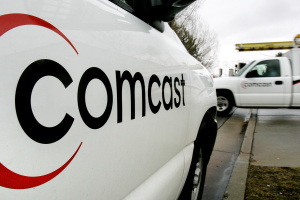Looks like Comcast is quietly pushing a 300 GB cap and overage charges
Here is a link to the full article this is taken from
We may be living in an era of growing gigabit connections, but Comcast will not go gently into that dark night of broadband-only subscriptions replacing its lucrative triple play. The nation’s largest broadband provider (with 20 million subscribers) appears to be rolling out a trial plan that offers a 300 GB cap on service with a $10 overage fee for every 50 GB above that.
Or put another way, Comcast wants to charge 20 cents per gigabyte when it comes to overage fees, which translates roughly into 40 cents per hour of HD television streamed via the internet. That might not be enough to stop you from watching Netflix, but at least Comcast makes a little more off the transaction. Depending on speeds you might pay more or less than this before you hit the cap. Basically what Comcast is doing here is threefold:
it’s adding another revenue-generating option,
it’s opening the door for usage-based broadband pricing; and
it’s trying to protect its pay TV business from the threat of cord-cutting.
And it’s not alone. Caps are on the rise in the U.S.
Broadband caps have grown to cover more Americans. They often come with meters.
Here’s what we know. DSL Reports said that a Comcast user in Atlanta received a note telling him of Comcast’s new plan, one that the cable giant has slowly been rolling out in southern states. From DSL Reports:
The 300 GB has been in trials in Nashville for some time, but back in August Comcast expanded these trials into the Central Kentucky, Savannah, Georgia and Jackson, Mississippi markets. In October, the cap trial expanded into Huntsville and Mobile, Alabama, as well as Charleston, South Carolina. Generally less competitive Southern markets have been targeted for the trial so Comcast can minimize the number of departing customers.
This steady expansion of the 300 GB cap implies that Comcast may have moved from trailing
a new cap to deciding which cap to implement. Charlie Douglas, a Comcast spokesman, says that this is just a continuation of the trials and the first one that will be conducted in a large, urban market. So far, he says that 98 percent of users would never hit the cap and that median usage is now at 16 GB to 18 GB per month.
Back in May 2012, Comcast abruptly eliminated its 250 GB cap (that was introduced back in 2008) amid allegations that it was violating network neutrality by exempting certain types of content traveling over a set number of devices from its data cap.
After changing its policy (and avoiding the network neutrality conversation completely) Comcast introduced a variety of new plans in test markets.
There’s the $5 discount plan for folks who only use 5GB per month.
There’s the different tiers of service get different caps plan plus overage fees.
And there’s the set cap and overage fee option, which is what seems to be spreading.
Look, I’m sick of writing this same story about how caps aren’t necessary, how they act as a curb on innovation, how they protect a television business that won’t adapt and how the cable companies don’t actually have a profitability problem when it comes to investing in their networks. What’s happening here is a five-year erosion of unlimited broadband brought about by a fundamentally uncompetitive market. And this massive shift on broadband policy was utterly ignored by the FCC, which refused to even gather data about caps for years.
Comcast doesn’t even attempt to justify caps anymore, because why should it? Consumers need broadband access to do their jobs, complete their education and engage in a variety of leisure activities. Cable broadband of the sort that Comcast offers is far faster and better than the DSL or copper-based fiber to the node options that telcos are providing, so anyone who needs speed will likely have to deal with Comcast.
And in areas where municipalities are deploying gigabit fiber, Comcast is going to try to influence laws, back sympathetic politicians and engage in the rhetoric that anyone using 300 GB is a bandwidth hog, as opposed to an early adopter or an indication of our future bandwidth needs. So as Comcast’s new pricing plan spreads across the south, don’t hunker down and accept this behavior. When Time Warner Cable tried to implement a far-more punitive usage-based pricing plan, users revolted.
State politicians were called and got involved and companies and news outlets raised an outcry. Perhaps Tom Wheeler, the new FCC chair wants to take a look at broadband caps and their effects and rationales given the U.S. broadband market. As Microsoft and Sony gets set to release new game consoles with online delivery of games that can range in size from 10 to 50 GB in size, perhaps they should step up and ask if users should pay a $10 broadband tax on a game download over and above what they already pay for broadband service.
We tend to see these trials and new caps and feel a moment of outrage, but what we need is a sustained policy conversation and pressure from both consumers and the industry affected. And since everything is going over broadband pipes, increasingly that industry is everyone.


2 Responses to Looks like Comcast is quietly pushing a 300 GB cap and overage charges